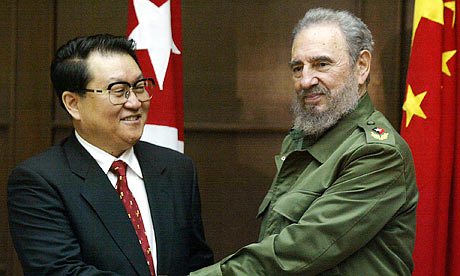China's propaganda chief named by US diplomats as the alleged orchestrator of hacker attacks on Google
- Dan Sabbagh guardian.co.uk,

Li Changchun, China's fifth most powerful man, was named by US diplomats as the alleged orchestrator of hacker attacks on Google's email systems last winter.
A member of China's ruling politburo, he is the individual in charge of propaganda and censorship and the man behind the "great firewall of China".
The Observer reported "a leading politician" was allegedly behind the politically inspired cyber-assault that prompted Google to retreat from China, based on leaked cables produced by the US embassy in Beijing.
Li Changchun was named overnight by the New York Times, which has access to the same diplomatic correspondance from the WikiLeaks website as the Guardian and Observer. A well-placed Chinese source told US officials the Chinese governmment "co-ordinated the recent intrusions of Google systems" and that these "closely held operations" were directed by the politburo standing committee – the most powerful body in the Chinese Communist party.
The US diplomatic cables record that China's unhappiness was to do with Google's refusal to remove a link from its censored Google.cn Chinese site to its uncensored Google.com. It was reported by embassy staff in May 2009 that Li Changchun had used the Google.com search, and that he allegedly found articles personally critical of him.
Google then came under pressure to drop the link to Google.com, culminating in the hacker attack last winter, part of which was aimed at the Gmail accounts of Chinese human rights activists.
Li Changchun had, according to this source "the oversight" of that operation with the assistance of a second, more junior member of the politburo, Zhou Yongkang – a hardliner with a reputation for dealing firmly with dissent.
In January, Google admitted its systems had come under attack but declined to say who it believed was responsible.
The attack provoked political outcry, with Hillary Clinton criticising the Chinese. Google relocated its search operation to Hong Kong in March, where it is uncensored, under the Google.com.hk address.
Google today declined to comment further on the allegations, although it is understood the company was long aware US officials were in possession of information that suggested it had come under attack from nearly the top of the Chinese political establishment.
However, the company's reluctance to upset the Chinese any further has contributed to its decision to remain low key. Google still operates in China, with Google.cn providing translation tools, and a link to the uncensored Hong Kong based-search page.
In China today there is no reference to WikiLeaks material relating to China on news sites, despite coverage of the leaked diplomatic memos on popular portals such as Tencent and Sohu.
It was never likely that authorities would allow coverage of such sensitive material to appear – particularly when some of it deals with their handling of the internet.
Access to the WikiLeaks site is thought to have been blocked for some time before the release of the US embassy cables. But articles about China-related cables, including those on the Guardian site, could still be reached at time of writing.
Some users on Twitter – blocked from the mainland, but still used by people who access it using proxies to mask their location – said translation of WikiLeaks coverage of China into Chinese was under way. It seems likely that material will not last long if it is posted on sites hosted on the mainland.
Political reaction was also muted. The foreign ministry, the ministry of industry and information technology, and the state council information office – one of the many government bodies involved in regulating the net – could not be reached for comment.
Earlier this week, the foreign ministry said it did not want Sino-US relations to be disturbed by the cables and would not comment on what they actually say, although a spokeswoman described their contents as "absurd".
More authentic reaction could be found on blog sites. A writer on the Sina microblog website said: "Reading [about] China and Google, I want to say: WikiLeaks rocks!"
Some were hostile: "What WikiLeaks says about China must be a slander from the US. What do you think? The US government hates WikiLeaks too? It must be a conspiracy," one commentator wrote on his Sina microblog.Another, more cynical reader, opted for satire: "I told my sister that WikiLeaks says that two-thirds of Chinese top officials have Swiss bank accounts. She said, 'What? Are you kidding?' Of course it is 100% of them!"

No comments:
Post a Comment